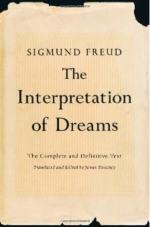
|
Chapter 1, Part 1
1. The main focus of Freud's book is the ___________ of dreams.
(a) disproval
(b) interpreting
(c) sharing
(d) dreaming
2. Freud hopes he will be able to _______ the dream process.
(a) clarify
(b) argue
(c) identify
(d) discover
3. Freud gives a ___________ background of the dream as it was regarded.
(a) historical
(b) simple
(c) argumentative
(d) daring
4. Freud likens dreaming to other kinds like mental activity like:
(a) Learning
(b) Hallucinations
(c) Creative processes
(d) List making
5. The ideas the dreamer has during the day carry over into the sleeping hours as __________________.
(a) Desires and loathings
(b) Desires and longings
(c) Understanding and longing
(d) Ideas and actions
6. Whose poetry does Freud cite as evidence of his own dream manifestations?
(a) Shakespeare
(b) Dickinson
(c) Frost
(d) Lucretius
7. The contrasts between dreams and waking states are ___________.
(a) irreconcilable
(b) silly
(c) obvious
(d) not Freud's concern
8. Dreams and reality are two opposing __________.
(a) movements
(b) studies
(c) realities
(d) phenomena
9. Who has a dream in which he knows the Latin names of several plants?
(a) Franz Joseph Delboeuf
(b) Lucretius
(c) Irma
(d) Sigmund Freud
(read all 180 Multiple Choice Questions and Answers)
|
This section contains 3,132 words (approx. 11 pages at 300 words per page) |

|




